#p5 meta
Note
have you seen the commentary from the p5r artbook going around? the shuake part of my dash is losing it a bit at the implication that their wishes were mutual!!! that seems to be what some people are getting from the commentary at least… amy insights?

Hi! I have been through the artbook. It's great, isn't it? :D
The image above is called "One Ending", and the creator caption (by illustrator Akane Kabayashi) reads:
When I think about how Akechi's wish was to play chess after school with the protagonist, I almost want to call him out with "You liked him after all, didn't you!"
Look at that. We're told about Akechi's wish, and what it included. We're as good as told outright that he likes Joker—and this isn't the only time, there's also this:


—There are a whole lot of things we can imagine, based on how the protagonist was depicted as someone special to Akechi.
Those are more or less the exact emotions represented during Akechi's confidant. (Mumon Usuda, chief designer)
"someone special" here is 特別な存在 tokubetsuna sonzai—literally "a special presence". It means a special person, and more than that; it describes someone you find compelling, someone you can't look away from, someone who becomes one of your most important people, the centre of your world. It's another term that is often romantic, but isn't necessarily romantic.
(In the same way, I think Kabayashi's suki jan! is more tongue-in-cheek than it is a cast-iron confirmation that Akechi was canonly in love with Joker. The language there is teasing, it's ambiguous, it's baity; Kabayashi is joking. This is a rank 6—as they say, if you know, you know. But it is of course ultimately up to all of you.)
There's another mention of this image, down in the creator interview:

Out of all the Maruki ending illustrations, it was Akechi's that stuck with me the most. It made such an impression to see them opening up as friends, having a fun, peaceful time together like high school students should. (Mumon Usuda, chief designer)
What really strikes me in all of this is the emphasis the creators put on the fact that this is Akechi's illustration, Akechi's wish. Because I've thought for a while that we know Akechi has a wish. You can see him struggling with his refusals to Maruki in the first week of January. And you can hear his wish spoken—when Maruki repeats it back to him, during the boss fight, on 2/3:
Maruki
{F1 81}君たちとなら、君も過ちのない道を歩めるかも知れないじゃないか!
{F1 81}-kun-tachi to nara, kimi mo ayamachi no nai michi o ayumeru kamoshirenai ja nai ka!
If you're with {F1 81}―kun and his friends, you could begin to atone for what you've done!
Think about it! With [Amamiya]-kun and his friends beside you, you could choose a path with no mistakes as well!
So this wish has several parts. First, there's that kimi mo, "you also"; it's tempting to read this as Maruki also wanting his new world to erase his past mistakes. Second, there's the first part, "if you're with [Amamiya]-kun and his friends". Where to even start here?
Being with Joker and the others is a prerequisite for the second half of Akechi's wish. It doesn't just coexist, it enables the rest of it. Just like his words in the engine room, "I wonder why we couldn't have met a few years earlier, [Ren]..."
Remember, Akechi's whole arc is about his rejection of trust and friendship, and his insistence on doing everything himself. This is precisely what Futaba calls him out on—"you trusted no one", or "you played life in single-player mode". This is what he unlearns at the climax of the engine room, when he realises he isn't prepared to let the others die—and follows through to save them.
Akechi is nothing without others, and he knows it. Without their support, which he believes he has no right to, he has no hope of living a better life, even were he to be given the chance—and he knows that, too. He has learned, and he has grown—and yet he knows the things he needs and wants so badly are forever inaccessible.
And his wish is about all the Phantom Thieves, not just Joker. There are many tiny references to this end—not least the original Japanese rank 10 line for his confidant, where he sacrifices himself for all of you. Joker is his compelling presence, his someone special, but he's formed small bonds with the others too, God help him.
and then there's the crime thing
The localisation frames Akechi's wish in terms of atonement, but that's not what's on offer. You cannot, after all, atone for things you never did. We see Akechi's wish put into practice, in the Maruki ending, where he appears with his friends beside him, wholly innocent and with unstained hands. And we see it in the first week of January, after he has finally met Maruki and spoken to him:

Akechi: Ah, that reminds me—there was one more thing I wanted to tell you.
Akechi: About the reality Maruki's put us in...
Akechi: It seems that Okumura and Wakaba are both considered alive by all accounts.
[Ren: They're not dead anymore? / What do you mean?]
Akechi: They aren't mere illusions, or cognitive beings—they truly are alive and existing in this world.
Akechi: In fact, their deaths seem to have never taken place at all in this reality.
[Ren: What happened to Shido?]
Akechi: Shido was the only one arrested on the crime of attempting to overthrow the government...
Akechi: It seems the Phantom Thieves were causing a stir in this society as well, but there's no record of your arrest now.
Akechi: Basically, in this reality, you and I haven't committed any crimes.
While Akechi still remembers his crimes, they never took place. They have been undone, and only his lingering memory—and Joker's, at this point—speaks to them. He objects to this on countless levels, he summons all the strength he has to refuse it, but don't make the mistake of thinking that means he doesn't want it. This is Akechi's wish in action.
People are often very certain that Akechi's resolve in the third semester is like iron—that he rejects Maruki's offers right away, is never tempted, never wavers. But that can't be true. We know he's afraid to die. We know about the bad end where you don't complete the Palace, where Akechi says nothing and stares at the floor, seemingly blaming himself internally while all the others blame themselves aloud, for being unable to say no to Maruki's temptations. We know how he responds to this assertion of Maruki's—Maruki, who has perfectly summed up what we know all the other PTs wanted, and who (even if Word of God hadn't just confirmed Akechi's wish) we have, honestly, no reason to doubt.
Because Akechi never refutes this wish that Maruki describes. He never says he doesn't want it. He just rejects it—like all the others, who so desperately want what Maruki could give them. Futaba's mother, Haru's father. Akechi's life, and his innocence. And the people who might have been his friends, if he could dare, one day, to ask.
Akechi is tested just like the others, and the price he pays for his defiance is perhaps the highest of all.
and finally
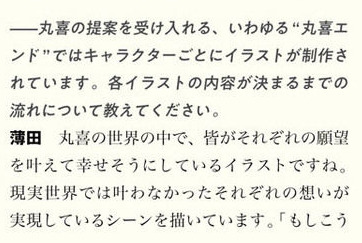
[The Maruki ending illustrations are] of Maruki's world, where everyone's wishes are granted and they seem happy. The scene shows their actualised wishes, which were never granted in the real world. (Mumon Usuda, chief designer)
We shouldn't forget the price Akechi pays for his impossible wish. Sure, the vision of himself being altered like Sumire clearly haunts him, and I'm sure it made the choice easier—but I don't think it made it that easy. Instead of taking the dream Maruki offered him, Akechi chose to face up to what he'd done, and who he'd become; at the very end, in the third semester and in the engine room, he always makes the right choice.
And that choice was taken away from him. Agency over his life and death, his own acts, and who he would even be—Joker and Maruki take it all away from him and make him a puppet, just like Shido.
Maruki's ending isn't pretty.
revision history
Click here for the latest version.
v1.0 (2024/03/29)—first published.
#asks#persona 5#p5 meta#things i translate#japanese language#word of god#shuake#goro akechi#takuto maruki
534 notes
·
View notes
Text
I dont like how often Ill see people say that Akechi "didnt ever" hate Joker, that hes always liked Joker, because I think a lot of the appeal of their relationship comes from how Akechi simultaneously loves and hates him, and insisting that he only feels one or the other - I think - kind of takes away from that.
Why? Why cant it be both? Why cant he absolutely despise Joker for making him feel inferior, for getting in the way of everything he has ever set out to do. Why cant he be angry at how now of all times he finds someone who can keep up with him and understand him? And why cant all that be true, and how he likes Joker for being everything he couldnt, for being a hero he could only wish to be, for, like him, never straying from his morals and convictions?
As I said before, I feel like not understanding this mix of love and hate undermines their relationship. But I also think it takes away from Shido and Akechi's relationship, too. Shido is Akechis father, and despite EVERYTHING, Akechi still does want that praise and admiration from him, he still wants to be cared for by his family. The closest people to Akechi are Joker and Shido, and he has a love/hate relationship with BOTH, and thats important because if the basis of those two relationships are the same, we can start looking at what the differences are.
Despite Akechi having such turbulent feelings towards both, the two relationships are so different, you can easily see the mutual respect and understanding and agency Joker and Akechi share when compared to Shido and Akechi. Insisting that Akechi only feels either love or hate towards either, or insisting that Akechi ONLY has a love/hate relationship towards Joker takes away from his character and the importance of both of these relationships and their effect on Akechi's character
Anyway... hope that made sense. Im just rambling thoughts I've never had time to write down before and also this is just firmly my opinion! I will not start hunting down someone just because they said akechi only hates or only loves joker lets all be civil thank you goodnight
#persona 5#p5r#persona 5 royal#goro akechi#shuake#akeshu#If I worded anything weirdly sorry Im tired :(( Im just a guy dont blame me#p5 meta
498 notes
·
View notes
Text
Akechi's taste in Literature
I've taken an interest in the books Akechi reads. Obviously from the first time you talk with him, you can already tell what he tends to: psychology, philosophy, and mythos. Also, I read at least a little bit from every text. One of my professors out there is proud of me. I hope. So: let's talk about it!
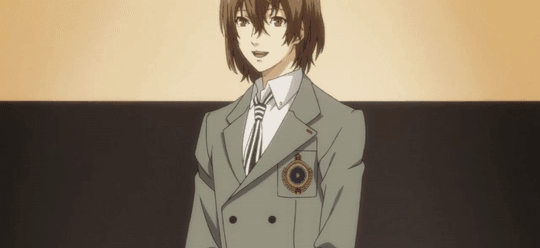
Ok, but why care? Quick Introduction
No particular reason. I simply want to tinker with his brain. I think it could give us insight on the character! And there's an easy way to dismiss this conversation: Akechi uses books as a way to appear intelligent. I don't think that's wrong per se, but he does express an interest in psychology and philosophy in his third semester Jazz Jin discussions. His thieves den conversations also point to interests in mythos. Use this as a "Annoying Person Bookshelf" if you'd like, I certainly will.
Aristole's De Anima (Mementos Mission - Chapter 3)
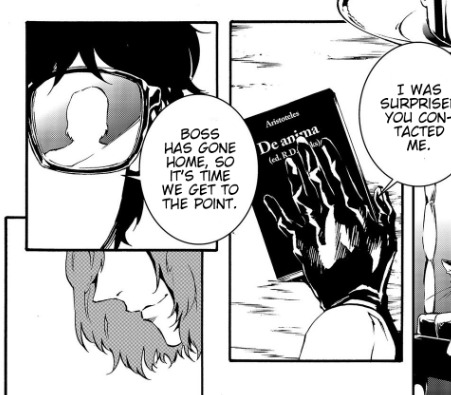
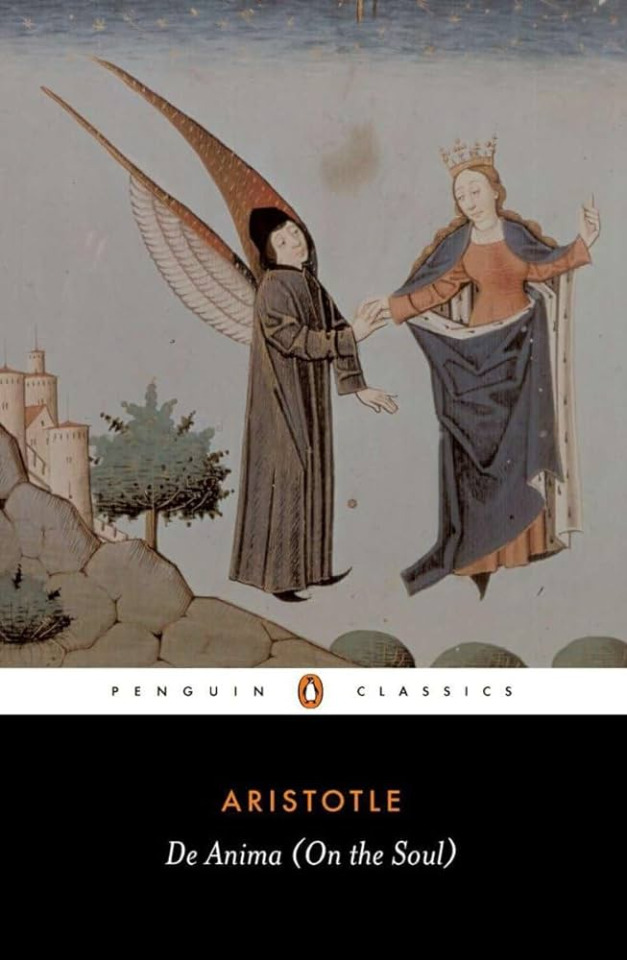
De Anima, or "On the Soul" [Leob Classical Library], is an examination of the soul and how it functions within the body. It's pretty dense but easily accessible. On page 15,
"There are times when men show all the symptoms of fear without any cause of fear being present. If this is the case, then clearly the affections of the soul are formulae expressed in matter."
Now, I'm not going to read every book, that would be a huge investment. And unfortunately I am still a university student, so I'll stick to the introduction/first chapters or so. But anyways, to the point of the quote, De Anima tends to get metaphysical. Theory time: Akechi has morbid fascinations with the soul. Not only because he well, kills people, but also messes with the restraints on their heart. I choose this quote because it's a good summary of the kind of body horror someone messing with you in the metaverse is like. It's fear and anger unchained, but it manifests in reality through subway accidents... for example.
Hegel's Dialectics (did Akechi misquote Hegel?) - Rank 1
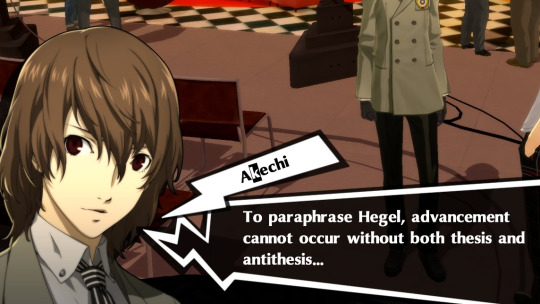
Look, almost all of these texts are slogs to get through, so I wouldn't blame Akechi for not catching this. Or not reading the 2017 in-universe equivalent of cliffnotes. Note: Dialectics refers to the structure/strategy that Hegel uses, not a text itself. Looking at the Stanford Encyclopedia of Philosophy we see that Hegel never makes mention of the thesis, antithesis, and synthesis idea. Rather, thesis-antithesis-synthesis is a pattern in his arguments. These are also projected by people reading his text, so we can't fully be sure he's using this to formulate most of his arguments. So not only has Akechi forgotten synthesis, the "unification", but also the fact that Hegel doesn't talk about this. Did he read Hegel? Probably. Did he retain the information? Questionable. Do I blame the writers for making the mistake? mmmm. Maybe. If you're asking me to guess which book he read, I would estimate it was The Phenomenology of Spirit [Google Books]. And yes, I'm going to say it was just because of this quote on page 9 that just, screams Black Mask:
"The force of the mind is only as great as expression; its depth only as, as deep as its power to expand and lose itself when spending and giving out its substance."
Maurice Leblanc's Arsène Lupin vs Sherlock Holmes (Herlock Sholmes) (P5A)
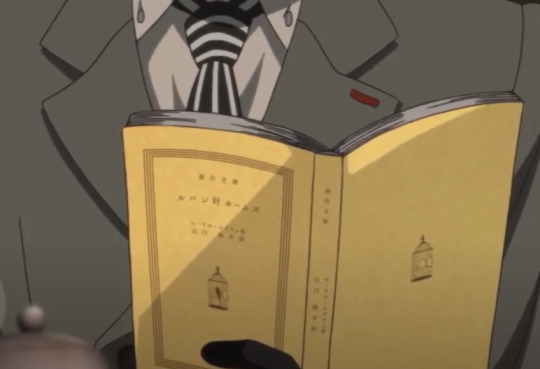

This book I read because my curiosity definitely got the better of me. Since I've gotten into Persona 5 again, I've been DYING to read this one, but never got around to it. I think this one is also interesting to look at based on how it was represented in the anime, a crow escaping a bird cage. I can say that this doesn't happen in the book, but this is why I think Akechi is self inserting on Holmes/Sholmes here. Holmes is much freer as a person in this text than Akechi, but also in a deep rivalry with Lupin. Their banter is also pretty reminiscent of what they [Joker and Akechi] have, but... with older language. Longer quote, so here's an image in its place:
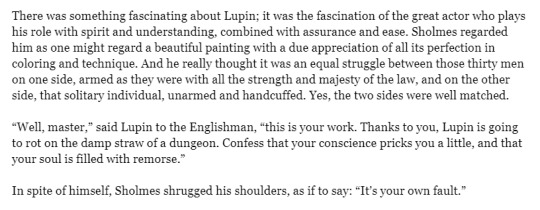
Edit/Correction: Edogawa Ranpo's Kogoro Akechi Series!
As pointed out by a couple people, we can't leave out this series. (credits to @heavy-metal-papillon) I don't know why my mind blanked and left this out. Because when I was doing research for this post someone had mentioned it. Just by name, it should be obvious why this is here! Here is a part of the preface that explains Kogoro Akechi, Arsene Lupin, and their presence in Edogawa's novels (written by Ho-Ling Wong):

Literature he makes references but doesn't mention (note: headcanon/my opinion)
John Stuart Mill's On Utilitarianism

Because Akechi knows how to flirt, he recommends philosophy to Joker. [Early Modern Texts] In my eyes he definitely doesn't agree with this philosophy (in fact some quotes are definitely more aligned with Maruki's philosophy). Page 8:
"That’s because the utilitarian standard is not
•the agent’s own greatest happiness but
•the greatest amount of happiness altogether; and even if it can be doubted whether a noble
character is always happier because of its nobleness, such a character certainly makes other people happier, and the world in general gains immensely from its existence."
Yes, Akechi reads Freud. Freud's essays: Beyond the Pleasure Principle & The Ego Principle
In an offhanded comment about Personas in the Thieves Den to Ryuji, Akechi says:
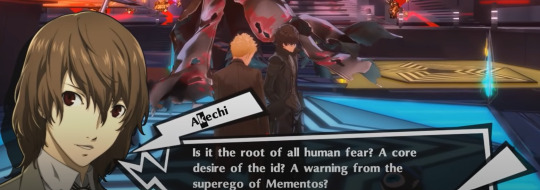
I love you Akechi. I will not read Freud for you. My love has limits.
Carl Jung's Two Essays on Analytical Psychology
Okay I'm NOT reading this (a lie, i did. [Internet Archive]) but this was the foundational text on the Jungian Archetype of the Persona as well as addressing concepts such as "the will to power." Going to leave this quote from page 78 for you to munch on:
"Logically, the opposite of love is hate, and of Eros, Phobos (fear); but psychologically it is the will to power. Where love reigns, there is no will to power; and where the will to power is paramount, love is lacking. The one is but the shadow of the other..."
There's a couple things here that point to Akechi reading this, but ultimately I just headcanon that he wants to reason through why Personas exist.
Generally reads about the casts Personas!
Similarly to how Joker can read about the other PTs Personas, Akechi does as well. Well, if his morbid discussion about Captain Kidd in the Thieves Den is an indicator. Does this mean Akechi is familiar with the Carmen stage opera? I think so. Besides, it's also the smartest move. Akechi (head)canonically reads lovecraft.
Conclusion
Akechi really enjoys psychology and philosophy, and while some of it seems like he's doing it for attention/to appear smarter, he DOES continue to show interest in third-semester/thieves den. I still can't forgive him for reading Freud.
The List (of ones directly mentioned here)
De Anima, Aristotle
The Phenomenology of Spirit, Hegel
Arsène Lupin vs Sherlock Holmes, Leblanc
On Utilitarianism, John Stuart Mill
Beyond the Pleasure Principle & The Ego Principle, Freud
Two Essays, Carl Jung
The Fiend with Twenty Faces, Edogawa Ranpo
Other notes and headcanons I can't justify giving sections to:
he probably read that fuckass billiards book
definitely stuff on justice. i was just lazy. Some of these texts do cover these ideas, but definitely not all of them
he likes detective novels. he's probably read a fair share of sherlock holmes.
he probably reads adjacent literature to some of the philosophers mentioned (for example: Nietzsche to Jung, Plato to Aristotle)
#goro akechi#p5 meta#p5r#p5#akechi goro#akechi#thinking emoji#making goro akechi's philosophies everyone's problem
130 notes
·
View notes
Text
Should Goro Akechi end up in prison after what he did?
Legally: I mean, yeah. He did kill so many people. He did so much shit. Even a plea deal can't save him much.
But personally? I say:
Fuck that shit.
Choosing prison as a punitive form of repentance does nothing to help people. It offers no chance to put one foot in front of the other, to struggle forward and deal with the weight of his past as he tries to be better. There is so much he could do.
Rotting in a cell does nothing.
It's the easy way out. One where punishment is payment for the debt of the guilt. A lifetime locked away doesn't undo what he did. A lifetime spent living won't either, but it gives a way forward. To prove himself. All that twisted anger and rage is so easily passion, emotion that can be put to use. If he still wants to be a hero, I'm sure he could find some way to make sure others don't end up where he was. I'm not sure he'd be satisfied with a simple job, not when there's more he could do, no matter the form it takes.
Punishment is easy. Change is much, much harder.
But he'd want the challenge anyway.
#p5#p5 meta#persona 5#goro akechi#akechi goro#persona 5 royal#p5r#egg speaks#my cat hasnt let me brush my teeth for an hr#so enjoy
79 notes
·
View notes
Text
“Si vis pacem, te ipsum vince”: the meaning behind Erina’s banner
I’m sure most people have noticed it, as it was shown firstly in the trailer and then in the opening: “Si vis pacem, te ipsum vince” seems to be the official motto of Persona 5 Tactica, and is indeed present on Erina’s banner when she uses Flag of Freedom.
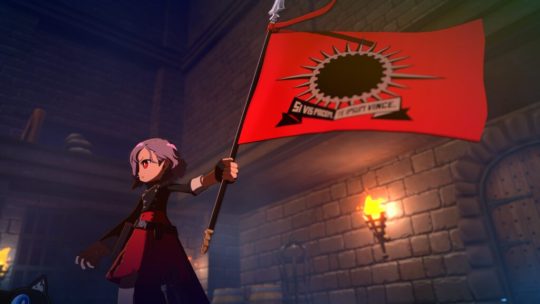
The slogan is in latin, it roughly translates as “If you want peace, you must conquer yourself,” and it’s an alteration tailored to the game from the most commonly known “Si vis pacem, para bellum” (If you want peace, prepare for war).
What most don’t know (myself included before digging deeper to make this post), is that even the “original” phrase wasn’t exactly born as such and is itself an adaptation of a wider paragraph from a military treaty — Vegetius’ De Re Militari or “Epitome of military science” (the following quote comes from the beginning of Book 3):
Igitur qui desiderat pacem, praeparet bellum; qui uictoriam cupit, milites inbuat diligenter; qui secundos optat euentus, dimicet arte, non casu.
From what I read, the author does a sort of introduction by citing war masters from the past, including Athens and Sparta, and declares his task in compiling all their teachings in one place. Then, he concludes by saying “Therefore, the one who desires peace shall be ready for war; the one who longs for victory shall diligently instruct his soldiers; the one who’s after success shall fight following the art of war, not chance.”
The concept here is clear: you can’t search for and uphold peace without being skilled in battle and ready to fight for that peace if need be… which is a pretty interesting message in the wider scheme of Tactica.
(Warning for story spoilers from here onwards)
I didn’t reflect on it much as I was playing, especially because the game never gives you any “official” translation of what’s written on Erina’s banner. But as I went back to thinking about it, I realised just how fitting this alteration is. The whole deal with Salmael is peace should be the ultimate goal for mankind, a state of existence where no conflict is necessary—on the contrary, conflict is viewed as a bad thing, because it causes hurt and is ultimately harmful. So it makes perfect sense that “Si vis pacem, para bellum” is something that goes against Salmael’s philosophy.
What bothers me, instead, is that it perfectly fits what Erina represents, as is and without any alteration: she battles Marie like rebels do tyrants because the peace in the Kingdom has been disrupted and she wants it back. Putting metaphors aside, Toshiro is the one that realises that only by opposing his father and his fiancé he can right the wrongs that his family committed, and eventually find peace within himself. “Si vis pacem, para bellum” is actually already tailored on what the game is about, so thinking back about the alteration they made, I can’t quite explain it.
It has to be said, though, that “Si vis pacem, te ipsum vince” is also fitting. Reconciling with one’s Shadow self, tame it and embrace it is what awakening a Persona is all about and what Toshiro does later on in the story, so to have “If you want peace, you must conquer yourself” written on Erina’s banner is also a really nice touch!
I guess my main point here is that both phrases go well with the story’s themes and plot, but I do have to say, removing “para bellum” kind of ends up reinforcing Salmael’s point, which is that war (=conflict) isn’t necessary. It ultimately serves P5’s whole narrative that puts individuals at the center of societal changes without questioning too much what role society at large plays: it is acknowledged society needs reform, but reforming passes through righteous people and removing bad apples rather than dismantling and rebuilding anew a system that is designed to be exploitative. More so that “te ipsum” is a bit like saying “you yourself” so I’d argue that a really great emphasis is put on the person/individual. Also worth noting that “te ipsum” is specifically male-gendered as “ipsum” is accusative cause (direct object) for both male (“ipse) and neutral (“ipsum”) pronouns, but “te” is accusative case for the pronoun “tu” which can only be used referring to a person; this means that if the phrase was to be female-gendered it would be “te ipsam vince”. So it really seems to be tailored to Toshiro.
I think what they did with Tactica’s motto is cool (if anything because it let me put my high school diploma at use again after 7 years lol) and definitely a nice addition that shows this game was made with a decent level of care for being a spinoff… at the same time, I can’t help but find a subtle contradiction in the alteration they made.
#persona 5#persona 5 tactica#p5t#tactica spoilers#persona 5 tactica spoilers#p5 meta#meta#p5t meta#persona 5 once again brainrottimg me to the point i go fish back for my latin
27 notes
·
View notes
Text
An Alternate
So, they basically save each other? (Ignoring the fact that you have to survive the interrogation to continue playing).
What if in an alternate universe? Getting Akechi's glove would be the difference between dying and continuing on.
Think about it, you didn't sell out your friends and got good ending. But, you-
A. Get didn't Akechi to R. 8. Allowing him to auto to 10.
B. Lost the R. 8 fight and never re-challenged and beat him.
C. left him at R. 7 or lower.
It would be funny if he was the key to surviving. Putting more emphasis on your relationship than there already is.
Nothing says I'm gay for you, like being able to survive being shot in the head because you got your "rival's" glove. Or very deep friendship. If you prefer that.
So, in that situation, what if you needed to not sell out your friends and got Akechi to max?
At that point, your opinion on Akechi would guide your decisions.
If you don't care for him, forgot about him or ran out of time 💀☠
If you like him, you'll move on.😁
It might change the Christmas Eve dialogue a bit. (Since you would need to max him to continue). Something like- "I knew you wouldn't disappoint me". Which would change the story. Because it would be you bringing him back into your life instead of Maruki granting our wish. Which would in turn change 3rd sem (if you got it).
At that point, would Maruki ending exist? Think about it, if you wish Akechi back into your life, on your own power. What does Maruki have to hang over your head? All your friends would be happy. Sure, Sumi would be brainwashed, but Ren is more concerned about bringing Akechi back into his life. Even brainwashed Sumi is "safe". If Akechi's safe, would Ren tell Maruki to go jump in a lake? (I would).
I don't think he would take the deal if Akechi was safe. Since the dialogue that comes up is tailored to Akechi, not anybody else. "If we go back, Akechi will be...". (I think this is the quote).
Say we will Akechi back into our life. That means when you beat Maruki, you'd go back to the original timeline and Akechi'd be with you, or at least near you. You'd probably still go to jail, sadly. No, Akechi'd be in jail because he turned himself in and he's now back in your life. Which overwrites you going to jail.
I'm not sure Akechi being in jail is any better than us being in jail. I'd prefer no one but Shido be in jail. But I guess somebody needs to go to jail unless we rewrite the game. (And Japanese politics/government).
I wonder if your friends would band together to get Akechi out of jail like they do for you. They don't care much for him and make it very known. 3rd sem makes everybody look bad. They went from "Come help us beat up your dad" to "We will kill you if you step out of line". Like I get it, but really the dude said he's going to help you. Where'd all the empathy go? Did it die in the Engine Room? Did they forget that Shido used a Child? Just like adults used them. (Like cut the poor dude a break. He saved your asses. Without him, you'd all be dead).
I think Ren could convince all non-party confidants and Sumi to help. Maybe Yusuke (Akechi and Yusuke are similar with shit fathers, dead mothers and shit circumstances), maybe Ann (she's more sympathetic) Ryuji (he's sympathetic, too. See: Sophia and Ichinose in Strikers). You might be able to swing Futaba. (She's not as murdery as Haru and she seems a little more sympathetic). Sae might be able to convince Makoto. Morgana's a cat and doesn't count. You wouldn't have as many people, but I think you could do it.
Bottom line: Ren cares for Akechi a lot. Even if the player does not.
#Persona 5#goro akechi#ren amamiya#long post#musings#Ren may be my fav character but Akechi's a close second#tag game#sorry for switching pronouns so much#I go from he to you to our to we#I hope this makes sense#P5 Meta
5 notes
·
View notes
Video
youtube
Was This Persona's Worst SL Rank? (An Alternative Interpretation...)
1 note
·
View note
Text
deleted sae palace scene makes me SO upset because of how much it really adds to Joker and Akechi's relationship. There's just so much?? Akechi slipping the cards into Joker's sleeve and intuiting/trusting that Joker will a) realise he's done it b) know what to do with them and c) wait for the opening that Akechi will provide later.
Like!!!! Joker very pointedly DOES NOT cheat in the first round despite knowing that the cards are on him. He waits for Akechi to insert himself, distract Sae, and set up events so Mona can give him an opening. They didn't even DISCUSS the plan beforehand, they just have such a deep understanding of each other by this stage that they can freestyle an entire plan
It's EXTRA sad this was cut from the game because I think it adds a nice poetry to 3rd semester where their showtime is completely improvised from their understanding of how the other thinks and trust in one another
idk. I just! wish that scene hadn't been cut!!
783 notes
·
View notes
Text
akechi's "i do not regret with my choices i'm rather proud" line in no more what ifs is so widely misunderstood it drives me nuts. it's a coping mechanism guys. it's a lie.*
(*that has an element of truth to it, as most of akechi's lies do.)
like. there's this trend to take the line at face value. he doesn't regret what he did for shido. he doesn't feel bad or think he did anything wrong. he has zero remorse. but you shouldn't take anything akechi says at face value, and regret and remorse are two very different things.
there's a lot to unpack here, so bear with me as i try to break it all down.
so okay, the source of this whole misunderstanding--the line in no more what ifs. i've gotten into this before in my analysis of the song, but the context of it is specifically in maruki's reality. goro is looking back on his life and thinking about where he ended up because of his choices. he's thinking, was i a fool? did i mess up? was there a better way? this line of thinking is reflected within the game itself when he explicitly says in the engine room that he wishes he met akira sooner, but that it doesn't matter what he wants because it's impossible to change what happened.
but here's the thing--that impossible wish he made in the engine room, where things were different and he and akira could be friends? it's no longer impossible. it's literally right in front of him. but it has a catch. accepting the reality of his impossible dream comes at the cost of being himself. all his choices and agency will be stolen, including the choices he made in the past that got him here. so he's left with one last choice--accept maruki's reality, give into his desires, and lose himself. or accept the choices he made for himself, and the consequences that came with them.
so, his conclusion in the song is that any what if's and regrets are pointless. he cannot afford to regret. he must be proud of what he did and who he is. goro is terrified of losing himself and being forced into becoming another puppet like he was for shido. (and notice--him acknowledging that he was a subservient puppet before, as he does on 2/2, requires that he's aware that the choices he is so apparently proud of weren't entirely his own. he was pushed there by someone else. he still blames himself for being manipulated, but a part of him knows that what he did for shido was wrong, and that he shouldn't have done it. doesn't sound like someone completely without regrets to me.) so he has to hold onto his choices and be proud of them. he can't let himself be tempted. the price he'd pay for them is far too high.
so, yeah. it's a coping mechanism. he's forced into that conclusion by his circumstances. akechi does regret where life has brought him and how he got there and the choices he's made, but regret is pointless, because he can't change the past and he can't accept maruki's future. so he chooses not to regret. people like him can't let themselves regret.
but of course, that's not all. in a post-canon world where he lives, goro isn't going to suddenly break down and be filled with remorse. because like i said, his feelings are complicated, and he still has his pride. akechi doesn't want to admit his faults or his weaknesses, and he does still think the people he targeted deserved it. so is he remorseful? yes and no. he is aware what he did was wrong, and that it was all for absolutely nothing. but he still doesn't view the world as something worthy of saving or protecting. to him people are all still inherently evil, save perhaps for akira, so what he did was both deserved and negligible, because the people he hurt were on the path of destruction regardless of him anyway.
so feeling for his victims and experiencing true remorse is going to be a process of recovery. at the same time, akechi still has the innocent child who wanted to be a hero hidden inside him. part of him does care, it's just been so neglected he isn't aware of it most of the time. that part of him began to be reawakened with akira and would continue to be as he makes connections, especially with the people he hurt like the phantom thieves.
which is part of why i think akechi befriending and reconciling with the thieves is so important! he needs to face the consequences of his actions and realize what he did didn't just hurt evil people, but innocents too. he needs to learn to see people as beings who can change, who are redeemable and are good. that people can love him even if he's done horrible things. and as he realizes these things about himself, he will eventually start to realize that it's true about the rest of the world, too.
goro wants to believe in the world, and in people. he doesn't anymore, but he wants to. when he starts to believe in people again, that's when he'll be able to finally be honest about his past mistakes, and feel true remorse for his actions and mistakes, and be able to start to make amends. the parts of the detective prince that reflected the little boy who believed in truth and justice are still in him somewhere, he just needs a lot of time, self reflection, recovery, and help to rediscover those parts of himself.
another aspect of this is how akechi voluntarily turns himself in. i do think there are ulterior motives here, mainly that he can be the one to help convict shido. it's also self-destructive, a way to sort of end his life when literally doing that didn't work. it's the path of least resistance, where he never has to truly look back on his crimes and self reflect because well, he's paying for his crimes anyway, so who cares. it's the easy out. but it also shows that he is aware what he did was wrong and that it's right for him to try to make amends. goro isn't totally without remorse or regret. his remorse and regret literally pushed him into trying to kill himself. he's just very, very bad at coping with them, and so chooses instead to repress those emotions like he has been for years.
okay, so, conclusion. stop forcing in lines in comics and fic where akechi is like "I don't regret!" without also portraying the nuance lying beneath that line. how in third sem it's a coping mechanism, and otherwise it's a shield keeping him from being honest with himself about his past and his ruined dreams of being a hero. remorse ≠ regret, and goro feels both but to different extents and different reasons. he hates his victims, but he's deluding himself about their guilt, and once that delusion crashes down and he sees that he's hurt innocents, he's going to have to deal with a lot of intense feelings like his already existing self hatred.
akechi isn't some heartless killer who feels nothing for his victims. he's only using that idea of himself as a coping mechanism. he forced himself to become that by repressing the parts of him that care until he can barely feel them anymore. he isn't just the black mask, he is also the detective prince. he's both. akechi is and always will be both sides of himself, even when he tries so hard to shut one of those sides down and ignore it as an aspect of the truth. you can't write akechi well until you understand that. akechi is always both.
so, does akechi regret? well...it's complicated.
#p5#goro akechi#sera posts#there is a separate but related meta about goro and agency that I want to make but its much less about goro as a character#and more about how both the game treats what he did and how the fandom does and how both are lacking#the nuance that the situation should be treated with#yet again another meta for another day#but hey I finally made the regrets meta I've been wanting to do this for foreverrrr#when I say forever I mean forever. I had a draft saved about this from almost two years ago lol#cw suicide#just in case bc of that one paragraph
169 notes
·
View notes
Text
thinking things about how ryuji's a character with such tragic writing past the first palace and his confidant. both of which you'll likely complete pretty early in the game anyway. he's not badly written, he's actually often an absolute joy, and i don't think his personality steps back unless atlus is trying to go for a really bad joke or something.
just sucks that in close emotional moments he goes on about being guilty for how he's acted, while the other characters all get to relate it to reflecting on their past and their traumas. it's like he doesn't even feel like his own is very important so he hardly talks about it and instead opts for saying he got too caught up in fame, or goes on about the phantom thieves' purpose being doing the right thing. it's sad, he should be allowed to talk about kamoshida the way ann does later in the game.
145 notes
·
View notes
Text
Quick snippet from 10/26. In case you ever wondered whether Akechi knows Mona talks all along... watch him here, and listen to him. At first he's on script—entirely in control even when he talks about how he was supposedly nearly murdered by himself. It's the same tone he uses on the news. He's gone over this speech a dozen times.
Then Morgana talks, and while Akechi does react, he's still acting. He's still on script, prepared and practiced. The portrait looks shocked, but the model is just standing there, playing detective....
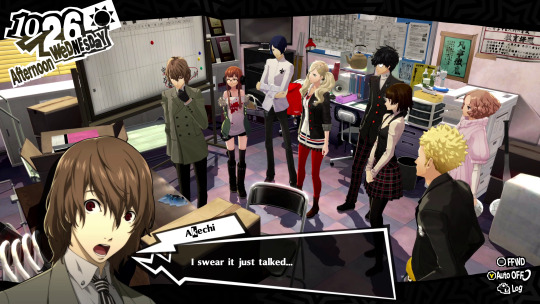
... until Ann steps in with "our friend who taught us about the Metaverse":
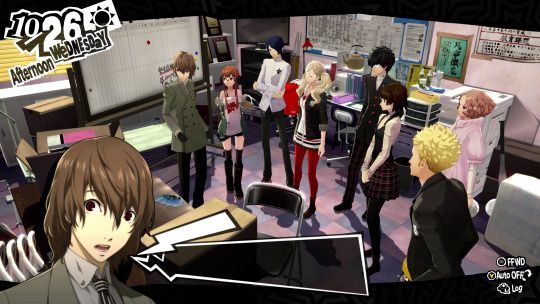
He jumps back so fast I didn't have time to load the textbox, lol. "What do you MEAN you had a MAGIC CAT GUIDE, the FUCK??"
Of course he knew Mona talks. How does he expose himself, right away on 6/9?—he hears Mona talking about pancakes. He had to be close enough to hear Mona, the cat. So it's not Mona talking that shocks him, but the revelation that Joker and the rest had help, had a guide from the very beginning, when he did not.
And you can hear his voice change register at that moment. That careful, controlled, rehearsed tone goes out of the window. He talks faster, he pitches up, he's breathless, without a script. He is, in short, more real. And he immediately asks Mona a question:
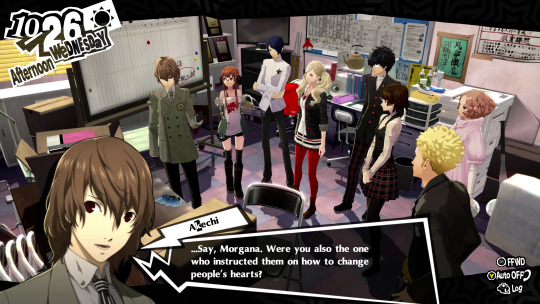
He really hasn't solved that mystery; he really wants to know. In fact, he has to know—about the difference in their methods and his own, which he just can't figure out....
There's a little of that high-pitched breathiness when he talks about his awakening, too. I'd say that's pretty much how it happened way back when, and he's adapted the story a little. "I can't die here... I need to determine the truth"—of course he did. The same truth that his "sole interest is uncovering"—the truth about Shido and himself.
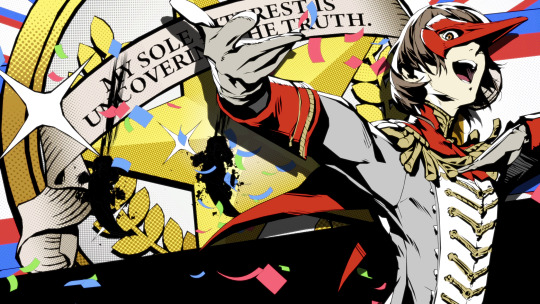
What about that image of the killer, standing in the entrance to Okumura's Palace? Well, sometimes people think this is a photo, but it's not—Akechi doesn't produce any more photos, he just continues with his story. So this is presumably what Akechi pictures in his mind at that moment. This is his self-image, God help him:
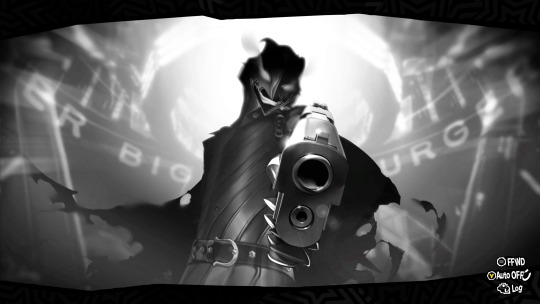
Lastly, here's an incredulous Akechi with a bonus Futaba glaring at him. Don't neglect the models—they really repay close examination, and the face animation is often incredibly detailed. And as for whether Akechi is lying or not at any given moment—it's often easier to tell than you think.
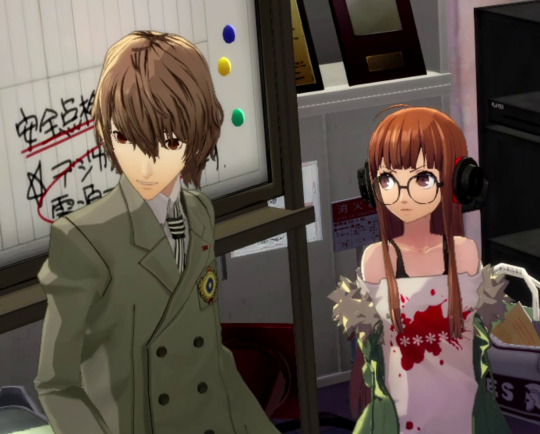
revision history
Click here for the latest version.
v1.0 (2024/04/18)—first posted.
486 notes
·
View notes
Text
Much shorter post tonight because I have like 5 other essays about Akechi in the making.
I often wonder what the connotations of him, as the black mask, having a helmet are, rather than just a normal mask - especially since it doesn't disappear or is removed even while summoning his persona.
Personally, I always viewed it like this: his anger and hatred is there to protect him when everything else failed to. A helmet is meant for protection, and I think thats what I think this persona is for. Any vulnerability can be hidden and buried and crushed under all of that hate. Anger is easier and more efficient than sadness and self-pity. It's so much easier to lay the blame at the feet of the world then to ever admit you may be the problem, or, in Akechi's case, lay all of your problems at the feet of one man and convince yourself that dealing with him will remove all your issues. I also like the idea of him not being able to remove it - his anger is such an embedded part of him that there is no taking it from him. There is no Akechi without that hatred and spite. (Dr. Maruki take notes.)
#if anyone else has any other ideas please share with the class these are just my thoughts afterall#actually one of the 5 essays relates to that last sentence maybe i should get back to writing#goro akechi#persona 5#persona 5 royal#p5r#p5 meta#this guy makes me so normal can you guys tell#of course you can you all feel the same
83 notes
·
View notes
Text
Another No More What Ifs Analysis
Okay, so... between wanting to analyze this and Our Light, and the kpop posts that I'll be doing that overlap with this. This blog will turn into Persona Music Analysis hour. Long post. Heavy spoilers for P5R, Proof of Justice, and Mementos Mission. BEGIN!

Let's begin with some context for the song. I think this is crucial to understanding why it is associated with Akechi's character. If you're familiar with this, you can skip to the lyrical analysis! The best analogy is that Beneath the Mask is to Akira as NMWI is to Akechi, in my opinion. Proof of Justice was an OVA released with the P5 anime (in May 2019) a couple months before the release of Persona 5 Royal in Japan (October of the same year). This OVA is centered around the relationship between Akira and Akechi. Specifically, Akira's grieving process as he goes through the places where they used to meet to find clues about the phrase "Proof of Justice" which was written in the Leblanc crossword. The Jazz Jin, as noted by Muhen here, is a place where Akechi would typically go alone. He also notes in confidant rank 4 that it wasn't necessarily a place that he was keeping secret, but that he never brought people around there since it was his personal space to reflect. As we'll examine, the content of the lyrics is too specific to not be related to the story, and there aren't any other characters or themes I could think are as associated with the song as Goro Akechi. Just wanted to clear this up first, as for some it's not entirely clear why the song is specifically Akechi's (since it's not explicitly stated, and the lyrics are hard to catch while you're playing through normally).
Lyrical Analysis
people come and they go
some people may stay with you though
I am all alone tonight and I kept on
asking myself questions
The very first line is one of the easiest to dissect. Goro, since the death of his mother, has had few stable figures in his life, whether it is his parents, family, or friends. This also extends to his line of work as a celebrity detective, as he is kept so busy that there are very few people he sees on a regular basis, at all. He notes in the second confidant rank (if you choose to ask if he has no friends) that he doesn't have people that he chooses to spend time with. [I chose this option on my last play through and remember it but I can't find the dialogue anywhere].
The doubt that grows in this verse comes from the second line. He is taken by surprise that there is someone he is giving thought to for more than a couple seconds at time. Someone he is... to some degree choosing to spend time with even though he is doing it for the mission. At first, to investigate the Phantom Thieves identity to prevent them from interfering in his revenge plot, and then to lure Akira into a death trap. Tying it back to the first line analysis with the third and fourth line, this dissonance has put the first example of his doubt in this song.
Conceited I was at time
I never really doubted myself
But tonight got me thinking about it all
if I am the fool or what not
There is a self-awareness that Goro always has about his personas (in the metaphorical sense). Goro kind of knows that he's arrogant and it was not ever something that bothered him. Even his character flaws will not get in the way of his plan, even if those flaws are just his humanity peeking through. There's a longing in Lyn's delivery of the last two lines here. He's stumped as to why he feels this way and the inner conflict makes him pause more than he is comfortable with.
"If I am the fool or what not." This line, is literally perfect, the double meaning is just ugh! We'll see this idea again near the end of the song, but I want to take an opportunity to talk about it now. For two years, Goro was the only Persona-user he knew, so he had no reason to believe anyone would ever stand a chance against him. Not only is he angered at himself for allowing Akira to get close to him and cause these doubts but he's also questioning what his role was.
I do not
regret with my choices I'm rather proud
ooh I know I won't change
anything
because I can only be me so
I had already written parts of this analysis like two months ago but I saw a post written by @vashtijoy here on how Mementos mission has a sneaky reference to this song. So check that out! It's something I never noticed.
Before Shido's palace, there's an acceptance of the circumstances in this line, that he has to do it regardless of what he may think because he has a goal. Throughout the third semester, we see an Akechi that is alive and tried to deal with the consequences of his actions before Maruki took that opportunity away from him. But he does not show remorse for what he did, that it was the only path he could have chosen with the information he knew.
How can I be so sure?
at a crossroads I'm afraid too
But I can't let fear get the best of me
Someone once said burn my dread babe
This verse... this verse makes me wanna cry. I cannot even lie to you. The direct statement that there is fear behind the fact that he doesn't want to kill Akira and the acknowledgement in the last two lines that one of them has to end up dead. That he is also acknowledging that Akira must also be fearful, by playing with fire through continuing to lead the Phantom Thieves. The doubt is consuming him in this verse. The crossroad offers two choices, one where he sacrifices himself for Akira and one where Akira no longer is with him. The reference to Persona 3 really carries the weight here with this theory. I would explain more but I only spoiler tagged for P5R so we move.
Who knows what tomorrow holds?
just wanna live my life the way I want
what fills up my soul is passionate
music that makes me want to sing
The first line, to me, reads that he's given up on allowing himself to think if there's another way to resolve his doubts. That there's another path where neither of them die and that it can't exist. He wants to live freely, which is what he thinks is assured once his revenge plan is complete. In another world, maybe it was one where both of them could be together without this chasing them. The last two lines I don't have a particular opinion about, but I think they add to the fact that Goro has given up entertaining other possibilities.
my story will be starring me just like yours ooh ooh
who knows when will it end
what matters most is how you bring joy to life so
I think about confidant rank 8. It feels written all over this line, and we come back to an idea that was present with "If I am the fool or what not." I think there's a bit of that 'hatred' that he talks about, that he's resentful that Akira story will end differently than his own. He's waiting for the day to come and resolves by centering himself, that once his goal is achieved, that he will achieve joy for the first time in his life. Refusing to acknowledge that Akira was showing him companionship that brought him happiness for one last time.
The Theme of Doubt
One of the things I have had trouble defining is what the doubt Goro is referring to is, or why the doubt is there. It's one of the things that is left in the air. Speculating here a little more than I usually will try to: the doubt stems from the fact that Goro is enjoying his time with the protagonist and is unsure what that means. In terms of what he is doubting, I'm not sure, I don't think he is referring to his plan, but rather the fact that Akira is caught up in it at all. His resolve to complete his plan never changes, but he wishes he could choose to leave him out of this. This tracks with a line stated by the SIU director which implies that some of the cruel actions carried out by the conspiracy/antisocial force by Akechi are not entirely his idea. He still carries them out without hesitation, but he never thinks of them himself. One of the reasons I wrote out this analysis was to see if there were any opinions on what this part of the song meant since I have trouble wrapping my head around it myself.
Goro, in base game and third semester, never shows any form of doubt or regret to the protagonist directly, only brief flickers and implications from dialogue. But this song is layered with it and bashes you in by telling you that it is what he is struggling with most when it comes to executing his plan. It's what nags at me even though I've tried to analyze this song a couple of times on my own.
IN CONCLUSION: I obviously hate goro akechi. (lying is fun)
#shuake#akeshu#akechi goro#akira kurusu#persona 5 spoilers#persona 5 royal#no more what ifs#persona music#persona analysis#i spent way too long writing this#can you tell this is my favorite persona song#p5 meta#thinking emoji
189 notes
·
View notes
Text
The personas you have equipped should impact the dialogue choices you have
(Note: I have experience with p5, and somewhat p4, none of the others)
But I just think it would be neat if personas actually.... had an impact on social links, on the protagonist's personality. The name of the series is Persona, and while they are clearly a centrally important part of the games, it feels like there's a divide that keeps them relegated mostly to gameplay mechanic
They are described as facets of the self, as aspects of personality given form. So if the protagonist has certain persona, it would make sense for them to alter the dialogue options
Mostly I see this being feasible with social links. The persona of the matching arcana unlocks a bonus dialogue option that can give the high +++ points for ranking those up.
It shows that aspect of the self resonating with the person you're talking with more, by providing an answer you wouldn't otherwise give, because that's not a part of you at the time.
It would add DEPTH!!
#persona#persona 5#persona 4#p5#p5r#p4#persona series#persona 5 protagonist#akiren#akira kurusu#ren amamiya#yu narukami#persona meta#p5 meta#egg speaks#(also itd lend more credence to DID wildcards and that is my beloved hc)
130 notes
·
View notes
Text
I Played Persona 5 Tactica, Here Is What I Think About It
I have long awaited Tactica since the first announcement trailer (yes, the one that got "accidentally" published by Atlus). After playing through the main story + DLC I needed to sort my thoughts & have decided to subject every other person on the internet to it.
First of all a few disclaimers:
Did someone ask me to write this? No
Do I care? No
Do I need to sort out my thoughts out loud? Yes :D
There will be spoilers for the entire game + DLC so read this post knowing that!
Lastly, this post is highly critical but it comes from a place of enjoyment of the game and love for the series. If that hadn't been the case, I would've never spent literal days collecting all these words in one place.
So.
Let's start by: have I enjoyed my experience? Yes, most of the time.
Would I recommend the game to someone else? Now that is a good question. Let's start from the theory.
What does Tactica want to achieve?
According to this interview by Business Producer Nomura, Director Maeda, and Composer Konishi, P5T had -- extremely summarized -- three main goals:
Maintaining the Persona 5 allure and imagery despite having a different gameplay and visual style
Making a strategy rpg accessible even to non-fans of the genre and non-navigated trpg players
Capturing "the straightforward and highly passionate feelings of the high school students, along with a slightly precarious, fleeting danger inherent in their straightforwardness" (Maeda, quoting from the Persona Central article previously cited)
If we hold what it said into this interview as our sole criteria for judging the game, Persona 5 Tactica aces most of it. I will go into each section deeper as this post goes on, but this game was clearly made with passion by people who have very clear in their minds what Persona 5 means, sounds, and feels like.
There is only one problem: it's not as clear who this game was made for.
Who's Tactica targeted at?
At its core, despite being a game that most likely only the more passionate P5 fans will buy, especially so far from P5's original release and so close to both P3:RE and the (plausible?) announcement of P6, Tactica's main story is so clearly made with the intent of being enjoyed by every possible P5 fan that the hardcore fanbase would probably be the last segment of players I would suggest that should play this game. Right from the start, it supplies you with practical notes about who is who, what key places you need to know, and other recap information from the previous game -- a nice feature, and very helpful... but clearly targeted at people who haven't touched P5 since 2017, or at least haven't been participating in some form of fandom in the past 6 years.
Don't get me wrong, there is nothing bad with wanting to appeal to every possible player -- Strikers, too, was purposefully designed to be enjoyed no matter your starting point for the series, the game, the anime, or the manga (or none of these things, actually). I find some form of contradiction, however, in the fact that not only the DLC, which acts as a prequel to Tactica's main story, technically has light spoilers for Royal, but also... of all the people I know -- irl, on the internet, among gaming creators -- who played P5 the majority of them still has only played P5. They haven't been interested in the slightest in all these spinoffs that have come out in the meantime, not even in Royal. (more about this on Reddit)
My point is: at this point in time, with the infamous cow-milking reputation Atlus has especially regarding P5, the people who have bought and are going to buy the spinoffs no matter what are the hardcore fans. But this game isn't made for them for the most part -- and that is something that can sour the whole experience.
I won't get into the debate about the canonicity of the P5 timeline, but Tactica seems to have a few ideas and well-confused about the whole thing. Because the DLC is Royal compliant, even touches upon "Kasumi"'s bond with her sister, and is technically set parallel to Sae's Palace. Which sort of makes sense since Royal and Tactica share their producer (Wada). But then there is no mention of Royal canon whatsoever in the main story (01.29.24 EDIT: I stand slightly corrected, as Maruki does get hinted at... but I also stand by the fact he's not mentioned in a way that truly matters, and my point about the Third Kingdom I talk about later on is still valid). Sure, much like Strikers, Tactica does not contradict Royal. But between not contradicting and actively enforcing there is a world of difference.
During the game, specific events of P5 are referenced, much more heavily than what happens in Strikers, with Shido and the political scandal being addressed more than once -- to the point where the December calling card is what prompted Toshiro out of his subservient attitude towards his father. Even Yaldabaoth is mentioned and compared to Salmael, the Big Baddie of Tactica, something that in Strikers was left much vaguer ("it's been x months since we fought a god"). And this does not happen for any of the Royal content. Despite the DLC, the Royal-compliant DLC, very clearly linking its story with the main one. Even more, the Third Kingdom and Salmael have an unmissable resemblance with the themes of the Third Semester and what Maruki was planning, parallels so apparent that you would expect someone to at least hint at what happened between January and February at some point.
Instead, there is silence. The themes are loudly there (and I don't know if it's just me, but the Hideout -VT- ost has interesting similarities to Ideal and the Real - End Version -) yet not once, not in the slightest does Maruki ever get mentioned or referenced or hinted at. (01.29.24 EDIT: as I added before, Maruki does get hinted during a conversation that takes place in the Thrid Kingdom... but it's no where near how deeply interwowen Tactica's story is with the ending of vanilla P5. This is what I meant in the following sentence where I say there is a disparity of treatment because there absolutely is.)
It's clear to me, given the disparity of treatment, that Tactica's main story doesn't want to contradict Royal in the same way that Strikers didn't, but Persona 5 vanilla is clearly the game you're supposed to have played before starting this one. Which, of course, is also reinforced by Akechi and "Kasumi" being locked behind the DLC. And I think I speak for a lot of people when I say that, if you're a hardcore fan (= most likely to buy Tactica), this probably isn't what you would have wanted from this game.
What Tactica does best
Tactica is a good game for the most part. As I was saying in my introduction, 2 out of the 3 main goals for this game have been not only achieved but aced.
Gameplay-wise, the loop can become quite addicting, especially between the last portion of the First Kingdom and the first half of the Second Kingdom, where imho the story peaks. The development team has done a damn well good job in reducing the structure of a trpg to its core and mixing it with what makes Persona 5... Persona 5. Much like the base game, for example, getting the upper hand through chains of One Mores and All-Out Attacks is basically how you progress through maps. Each Thief has his own Persona + 1 equippable sub-Persona -- even Joker can only use Arsène -- but they made sure to translate each different element into a different mechanic. I adored that, exactly like it happens in the first game, despite the combat being turn-based the characters seem to dance on the battlefield, with each action flowing into the next one as the hype builds up and either Lyn's voice or catchy drums accompany you turn after turn. Don't expect something too complex, as the game is designed to be accessible even to non-strategy players -- and surely I was disappointed by having to play with only 3 characters at a time -- but the fun is there, and to an extent, you can build each character how you most like them through a minimal but very efficient skill tree.
The music is another thing Tactica does very well. By now (Strikers, Royal, and Tactica) it's clear that Konishi favors aggressive guitars over groovy basslines and I didn't mind it one bit, as this became kind of his personal signature. The first portion of the game especially is full of banger hits that get later reprised and remixed as you progress through the Kingdoms. Some of my favorites:
Maxim, like many tracks, has an excellent use of percussions that resemble war drums
Tension, with clear Life Will Change influences
Infiltrate, back at it with the Life Will Change vibes and an exceptional use of strings that resemble horse hooves running on the cobblestones of a medieval city
Master of the Castle, which plays during the Marie bossfight, is an excellent mixture of the Tension theme with the addition of a more aggressive guitar and... bells! Because she's about to get married!
Amusement Park of Trauma, a strong detachment from the general mood of the Second Kingdom that perfectly serves its purpose
Recollection, a melancholic theme that through its notes perfectly sets the mood for what the player is about to go through as soon as they set foot in the Third Kingdom, much like Gentle Madman before it
01.29.24 EDIT: as the beta version of Last Surprise was discovered, I was able to catch a bunch of notes between 0.18 and 0.30 that I am fairly sure are present, rearranged/with guitars only, inside one of Tactica's OSTs too. I just can't seem to find it so I will add the specific one as soon as I spot it lol
Along the new tracks, some very neat rearrangements like Beneath the Mask (which somehow they managed to make it sound even more lo-fi than it already was) and Disquiet make their apperance, as well as a version of Prison Labor.
Also, contrary to what happens in the hellscape of info dumping that is the first hours of Strikers, tutorials are actually paced wonderfully here, and you get to be introduced to each bit of gameplay with little steps, and nothing gets shoved down your throat leaving you with so many information you actually have no idea how to play.
Additionally, the story is quite captivating, especially if you pay attention to what can seem to be minor details. Right from the start, the sheer need to understand what the hell is going on is what drives you forward, and by the end of the First Kingdom and Marie's reveal as Toshiro's fiance, you start to understand that the scope of the entire thing is much more limited and personal -- which is something I appreciated a lot. Toshiro is a good character, his cowardice at the start isn't just a funny trait for the laugh, but a flaw that is deeply connected with his personal history and, much like with Zenkichi and Sophia, the team did a good job in tracing parallels with the other Phantom Thieves in order to quickly build empathy towards him -- with Haru and Futaba being the absolute best matches. The same thing happens with Erina, who shares the rebellious fire of the Phantom Thieves and leads the rebellion against Marie. What I loved about her is her goofiness, I was afraid she would be the nth Strong Female Character -- seeing as Kasumi was very much your Manic Pixie Dream Girl -- instead I found a lady with a sharp tongue and a strong heart, who's deeply loyal but doesn't hesitate to fool around. She's really valid, I admit I wouldn't have bet on her character to be like this but I'm happy they took this direction with her.
So... all is good, right? Why do I say that the game "is good... for the most part"?
Tactica's recycling problem
Fundamentally, and believe me it pains me very much to say this... Tactica doesn't have a lot to say, despite what its developers declared.
The game's themes, characters, morals, and climax are all heavily derivative of themes, characters, morals, and climaxes that have already been more than explored within the various iterations of P5. Past the final portion of the Third Kingdom, the repetitiveness of it all became seriously unbearable. No thing, big or small, gets spared: this is how you find yourself with Toshiro mathematically relating to all the Phantom Thieves, even when it feels forced; how you have the battle against Shadow Toshiro and then Eri that is 1:1 what we saw in Futaba's Palace with the fight against Wakaba; how you have the nth Deity Wished By Mankind that wants to rule over Free Will; how the "Fourth" Kingdom is nothing more than a recycling, reskinning, recoloring of what you already played through the previous Kingdoms -- mobs and bossfights included.
It really does a disservice to the game, the fact that so many of its final portions are stretched out to the point of exhaustion, I imagine only for the sake of justifying the cost of the game with more playtime, something that is deeply wrong, especially if we take into consideration that the game is actually sold at (less) than the current average market price (60€/$, compared to PS4/Switch games being 60-70 and next-gen games being 70-80). It kills the climax that Tactica so painfully had built up to that point, and it made me feel like completing the story was more of a chore I had to do in order to get to the final cutscene (which... is fine, I guess) than something I did with heartfelt conviction.
Moreover, the deeply derivative nature of this game causes more than some issues, character-wise. Because this is a game with the Phantom Thieves... but narratively speaking, they aren't the protagonists: Toshiro and Erina are. This leads to a weird situation where the group, who has by now 2 god killings under their belt, remains stagnant throughout the whole game, as they have nothing to learn or improve about them, and too often they become nothing more than the mask (ah-ah) of themselves, with characters acting just like their archetype -- Yusuke, the starving artist; Morgana, who gets angry when he's called a cat; Ryuji, the dumb guy who's the butt of the joke. Incredibly speaking, the one who feels less like herself is Makoto: in P5 she can be tough and confrontational, sure, but you have to provoke her, first -- she's usually kind and collected, with a sort of mom-friend attitude. Strikers played a bit more into her punk side, and Royal gave us her wonderful Showtimes with Haru and Ryuji... but in Tactica, she's straight-up aggressive and quick to violence, often excessively, often for no reason. I have no idea what happened with her honestly, the day of the wedding in the imaginary vignette she even accuses you, unprompted, of cheating on her. Are the writers Makoto haters?
Anyway. My point is, as much as Toshiro and Erina hit home and do their job as characters, and as much as it's heartwarming to have the whole gang together again... sometimes, especially near the end, it sure feels like everything is just an excuse to have more Phantom Thieves content. Which would not be bad! But it is the moment Royal gets ignored and all the progress and maturity they gained is erased.
Overall, I think Tactica has a great cast and great premises, but the final portion of the story has really been dragged for too long, and the amount of recycling between ideas, assets, plot points, and maps is... not great.
Tactica's mysterious mysteries
There is a whole lot that is never given clarification in this game, and well beyond the realm of plausible fan speculations.
So many things went unexplained or even unaddressed. The Metaverse should by all means be gone at this point -- yet it's still working, and the only comment you get on the matter is "I guess it can't be erased completely" which is fine seeing how it's so tied to the human subconscious but an element so important to the worldbuilding really is treated like Just A Thing That Is Said and never given more consideration. Additionally, it is said that Kingdoms aren't Palaces... but functionally speaking, we explore Toshiro's Palace. There are cognitive versions of his family and acquaintances, there are memories locked inside the maps, there is his Shadow... there is no formal reason for it not to be Toshiro's Palace! Except that they needed to market it like an Entirely Different Thing somehow! On this front, Strikers did a really better job in connecting to the canon worldbuilding of P5.
Another thing that goes entirely unaddressed is how exactly the Phantom Thieves have been summoned inside Toshiro's cognition. The game explains that Shido's calling card was what roused Toshiro from his complacency, and what generated Erina as the spark of his rebellion... but it's never explained how the Thieves got in, especially given that it's explicitly stated that they entered in a different manner than Toshiro, who was kidnapped by Salmael, Persona 4 style.
All the weirdness of this new world, Personas not working as usual, the Velvet Room changing form... everything is addressed merely in passing, diverted back to Salmael's doing, or even straight up commented by Lavenza with "I have no explanations for this behavior."
Again, lastly, some things are brought up and never addressed again, like the fact Erina can plant the Flag of Freedom but the Flag itself, as a mechanic, only has relevance in the First Kingdom; or the fact that doors with a projectile on it are used to traverse Kingdoms and are what evoked the Phantom Thieves, but no one will ever explain to you what those are or why the Phantom Thieves don't traverse one back to return to the real world, instead they simply... *fades to white*
But what about the DLC?
The DLC is enjoyable but has, on a smaller scale, the exact same problems the rest of the game has.
Some bits of dialogue and character interactions sent me flying, like the way Joker can tease Akechi in a way he doesn't do with any other character or the fact that whether or not Akechi is a Phantom Thief is treated as a complicated matter, and you can trigger some interesting remarks about the whole situation going on outside of Tactica.
Aside from this, the DLC most than anything else suffers from being set in a pocket of time that needs to be wiped from memory, firstly because these three characters aren't exactly a trio yet and only had one interaction together before this moment yet they act like they're closer than that... and secondly because the whole Guernica situation is a parallel to Kasumi and Sumire's story. So it really hits the wrong way, and it even verges on horror if you have the hindsight, that Akechi, Joker and Violet have to save a girl that lost her sister and is being brainwashed to forget her... while Sumire is still "Kasumi."
I liked the setting and I liked the paint mechanic and I liked how frankly brutal and visceral some scenes are. That is exactly my jam! But I couldn't enjoy them to the fullest because I knew they would have amounted to nothing in the grand scheme of things. The memory wipe solution was in store, of course, I saw that coming, nonetheless I found it deeply unelegant, seeing as they didn't even try to offer an explanation as to why or how the trio had their memory erased.
Also, it makes no sense for Guernica to be active in the real world at that scale if only because there would be no reason for her to never be mentioned anywhere after, and I quote, "pulling a stunt like the ones from the Phantom Thieves."
On a final note, since I mentioned the base game's price... contrary to that, Tactica's DLC isn't worth the 20€/$ you pay it. Not only because it's very short (4-5 hours if you rush, 6-8 if you take some more time to maybe restart some maps or replay some dialogues and gush like I did) but because the experience is overall nothing memorable, and the additional maps aren't enough to cover that. I stand by the fact you shouldn't judge a game's price by its length, but length isn't Repaint Your Heart's sole problem, sadly.
My final thoughts
Overall, I enjoyed playing Tactica (save for the final part) and it gave me some really stellar content, like the fake wedding scenes, Ann's best characterization across the entire series, Erina as a character, and overall a new occasion to spend time with my favorite band of outlaws teens.
I'm glad I had more P5 content... but I still feel I could've gone by with no problems without Tactica. Which is a sad thing to say, but it's true. Because I loved Strikers and I would never want to live without having played that game. Tactica, well... despite me being hyped for it a ton, it made me come to the conclusion that I am done with P5 content, especially if it has to be like this. If I feel nostalgic, I'll just boot my PS5 and replay Royal for the second time. And for everything else, there is fandom.
Thank you for reading this far if you have. You can find me on Twitter, Ao3 and BlueSky!
#persona 5#persona 5 royal#persona 5 tactica#p5#p5r#p5t#spoilers#p5t spoilers#p5r spoilers#tactica spoilers#p5 meta#meta-ish at least?#not a review#not fully meta#but a secret third thing#aka my honest thoughts
13 notes
·
View notes
Text

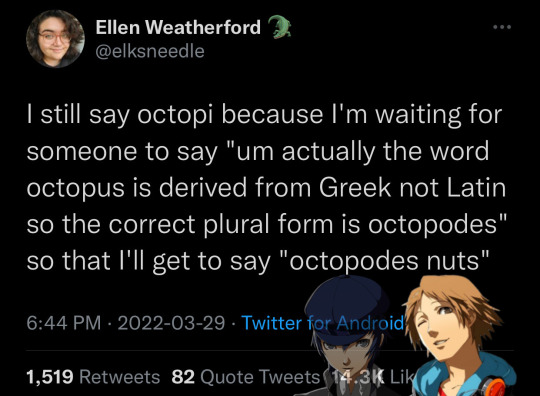
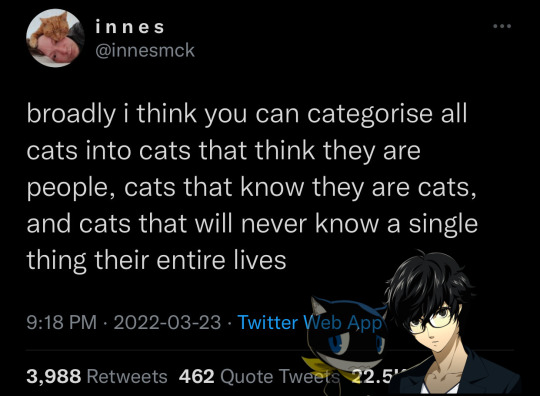



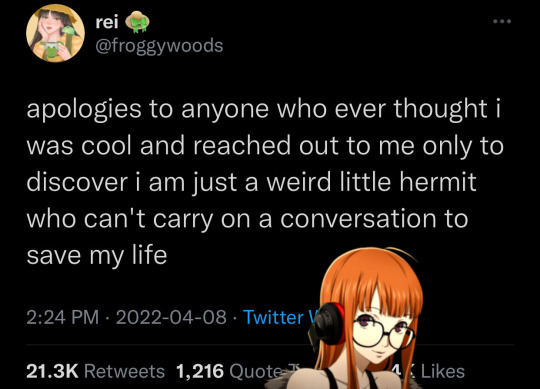

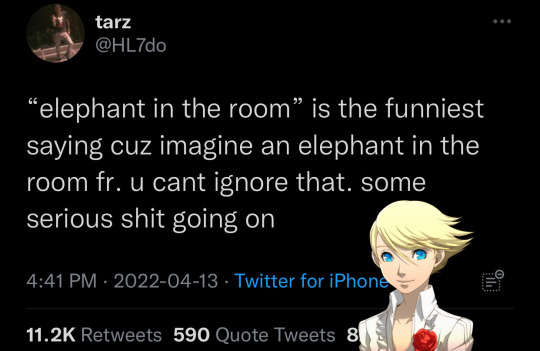

Hey guys guess what
Part 6
#persona#persona 4#persona 5#futaba sakura#akira kurusu#ren amimaya#ryuji sakamoto#morgana p5#yosuke hanamura#yu narukami#souji seta#rise kujikawa#naoto shirogane#kanji tatsumi#pegoryu#souyo#mine#some of these were very meta so i incldued them👍#oh shit i forgot to tag#teddie p4
688 notes
·
View notes